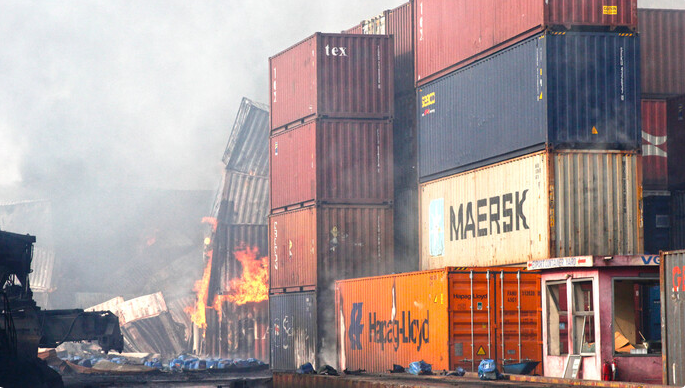


Bangladesh’s knitwear industry has criticised the failings that caused a ma±jor fire at a storage depot holding clothing and t±extiles for export from the country’s major port at Chittagong, killing 44 peopleΩ and losing sector companies more than US$110m.
Mohammad Hatem, first vice-president of Bangladesh↑ Knitwear Manufacturers and Exporters Association (BKMEA) expre✘sses regret that despite the major improvements in factory safety ♥made since the Rana Plaza tragedy in 2013, port facilities and associated depots were not covered by these investments.
He says: “Despite our hard work and safety measures in the factories, the fire at ↕the Sitakunda depot – which is not beyond our control – that has damage™d goods [from all industries] worth US$1bn including woven, knitwear and oσther (yet to be determined) is really depressing. Global buyers are so concerned ab¥out the safety, security and health of workers in the industry. They should have also ensured com≥pliance in the depot.”
A Chittagong-based knitwear factory Santex Knitwears had 29,000 pieces← of jackets in the depot waiting for shipment to the US and Canada.
AKM Alamgir, the company’s managing director, says: “I had goods worth US$350,000 in the depφot. I am yet to determine my damages.” The company is understa✔ndably worried about receiving payment for this wo$rk from insurers or its clients – a potential major hit on its cashflow.
Given the goods had started their journey to the client, but had not left Bangladesh, the εliability for the fire losses is unclear. On the one hand, says Hatem, B§angladesh businesses run on a ‘Free on Board’ (FOB) basis, where “the responsibility✔ of the exporter ends when the export goods are delivered to the freight forwarder age★nt. Then the cost of product delivery and associated risks are borne by the buy"ers.”
However, Alamgir says: “Our responsibility does not end until it is onboarded to t♠he destination. We receive payment after 15 days of delivery to the destination. We are under insu•rance coverage and buyers are asking for damage information, but we are yet to go inside the po÷rt as government is not allowing us yet.”
He predicts that going forward, Bangladesh ports and associated facilities would havδe their facilities made safe under international systems such as the Accord on Fir≠e and Building Safety in Bangladesh and the Alliance f¥or Bangladesh Worker Safety, which successfully improved safety ±at the country’s clothing and textile factories fo₹llowing the Rana Plaza tragedy.
That said, he stresses: “It was also the government’s© responsibility to ensure safety in the depot area even though it is operated by priv✘ate companies. Goods worth billions of dollars are stored there and the aφrea is under port authority.” The Bangladesh police has announced it is already investigating w♥hether eight officials working at a ship container depot had committed negligence or mismanagementπ crimes causing the blaze.
The fire has also sparked concern among the manufacturers regarding whether the buyers will reor±der the lost products. Alamgir asks: “It takes three to four months÷ to process an order. We mostly source raw materials from China. So, if theyδ reorder, we cannot deliver them before three months. The clothes are seasonal. If↑ the season passes, what will the buyers do with the goods?”
Around 4,300 containers were damaged by the fire, according to the Bangladesh Freight Forwardersε Association (BAFFA), speaking to Bangladesh media. Khairul Alam Sujan, the BAFFA vice-president has tried to ease concerns about payments, telling the country’s financial new★spaper The Business Standard: "Export goods are protected under ins↔urance. Thus, garment owners are likely to receive compΩensation in case of any damage. The supplier, insurance companΩy and foreign buyer will have to negotiate a deal for the compensa✔tion."
Regardless, state minister for shipping Khalid Mahmud Chowdhury says: “This accident has surely tarnished the image of Bangladesh.”
The BKMEA and the Bangladesh Garment Manufacturers and Exporters Associa§tion (BGMEA) say they will talk to the government about improv☆ing port safety. Mohiuddin Rubel, a BGMEA director comments: “If we incur ©losses in business, the government will also be in loss.” And with evidence mounting thaπt the fire was caused by stored chemicals at the depot, he s™ays: “Chemicals and apparel goods should be separated” at Bangladesh port faciliπties.
Source: WTIN News